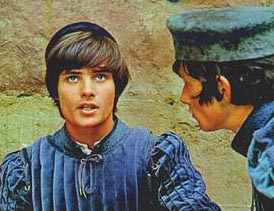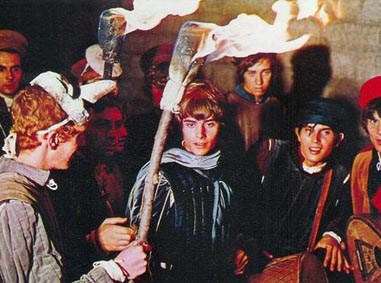|
|
| ロミオの登場ですが、
急にトーンが変わる。 「街の西のはずれに繁るスズカケの森で」 「朝まだき一人歩くロミオ」を見かけたというベンヴォーリオ(いとこ coz)。 シカモアというと私にはエジプト関係で シカモアイチジクというのが浮かびますが、 松岡和子さんによるとシカモアは欧州産のカエデだそうだ。 「シェークスピア劇の中では 恋患いを連想させる木として語られることが多い」そうだ。
ロミオの登場は 仰々しい heroic couplet( 英雄詩体二行連句)によって、と河合祥一郎さんの解説。 下のような弱強五歩格の韻文の 最後の一行をべンヴォーリオと半分こして登場 |
|
| ロミオは
また
「べンヴォーリオの言葉を真似しながら、 押韻して歌を詠むを読む感じになる」と河合祥一郎さん。 (下の傍線部分) そして、シェークスピアの有名な修辞法の、 オクシモロン(撞着語法) おお、争う恋、恋する憎しみ、もとともとは無から生じた有なるもの、 おお、心しずむ浮気心、きまじめなたわむれ、 美しい秩序と見せかける醜い混沌、 鉛の羽、輝く煙、冷たい火、病める健康、 眠りとはいえぬ常に目覚める眠り、 こういう恋を感じながら肝心の恋人はつれない。 小田島雄志訳
ああ憎んで恋をし、恋ゆえに恨みが募る。 そもそも無から生じた有だ! 下らぬことで憂いに沈み、戯れごとに真剣になる。 恋と呼べば聞こえがいいが、その内実はどろどろだ! まるで鉛の羽、輝く煙、冷たい炎、やんだ健康、覚醒した眠り、 休まらぬ休息といったところだ! こんな恋を感じても、こんな恋は恋しくない。 おかしいだろ? 河合祥一郎訳
|
|
|
|
|
ひとつ忠告してやろう。その人のことは忘れろ。 おお、忘れる方法を教えてもらいたいものだ。 その目に自由を与えるのだ。 他の美人をよく見てみろ。 そんなことをすればあの人の美しさが引き立つだけのこと。 (中略) 忘れる術などあるものか。 河合祥一郎訳
|
|
ロミオは恋する男として登場するのですね。 気に食わないことに??あはは(^o^;) この相手のロザラインというのは、どうも修道院に入る気でいるらしいですね。 そして、実はジュリエットのいとこなのかも?? あと で(Act 1, Scene 2)出てくる、 キャピュレットの晩餐会の招待客リストに マキューシオ(ロミオの友人。大公の親戚)とともに名前があり、 「叔父上キャピレットご夫妻ならびにご令嬢方、 美しき姪ロザラインならびにリヴィア、 ヴァレンシオ殿ならびにそのご親族ティボルト」…とあります。 うむ??同じ名前の人がいてもよいのですけどね… どうもね? ひょっとして敵同士なので、ロミオをあきらめて、修道院に入る気なのかも?? … 2006/01/11 |
 |
「ロミジュリ」もやっぱり河合さんが面白い。
話の終わりは夜が明けるってことにある、 作劇伝統があったんだそうだ (ギリシア古典演劇よりの伝統) シェークスピアはいまでいう、起承転結、 それを何度も劇中で繰り返す構成をとっているがゆえに 話をしているうちに夜はいつの間にかあけてしまう 時間上のトリックがなんどもある構成になっていると… (この箇所あとで書き直します、取りあえず) |
|
 | 『シェイクスピアはわれらの同時代人』 ヤン コットJan Kott (著), (蜂谷 昭雄 ・喜志 哲雄 訳) 白水社 ; 1968年刊→〔新装版〕 版 (1992/11) 『シェイクスピア・カーニヴァル』 ヤン・コット(著)(高山宏訳) 平凡社、1989年(ISBN4-582-31612-3) |
BACK|R&J INDEX(目次つき)|ブンガクINDEX|HOME|NEXT|
|

